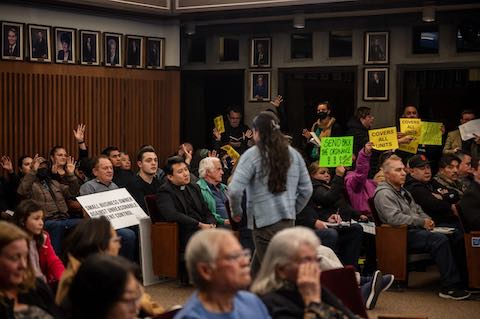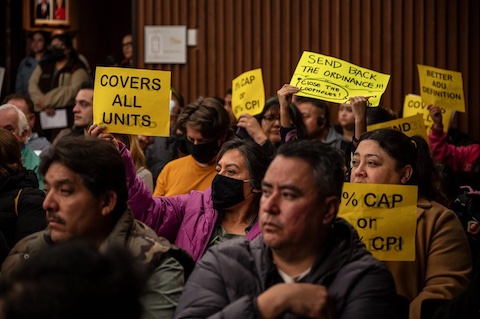
06 Jul San Pablo Says It’s Committed to Renter Protections but Has Other Priorities

(Screenshot captured by Samantha Kennedy / The CC Pulse)
By Samantha Kennedy
San Pablo City Council said July 1 that it remains committed to exploring stronger renter protections, but members questioned whether new measures are necessary and whether they would make a difference at all.
Vice Mayor Elizabeth Pabon-Alvarado, for example, asked what good certain additional protections could do if landlords already disregard state law and blamed tenant lawyers for failing to protect residents.
Council member Rita Xavier said the city “really needed to follow up on” the claim that rent control causes homelessness and mentioned “a long list” of emails opposing rent control. “I think you see where I’m coming from,” she said.
Both, in addition to Mayor Arturo Cruz, backed the commitment to increase certain protections. Only council member Abel Pineda, who spoke at length about the need to support renters and called the move “redundant,” voted against the commitment. Council member Patricia Ponce was absent.
The re-commitment includes prioritizing the exploration of just cause eviction protections that go beyond state law and anti-harassment protections for tenants. It comes almost three months after the council first made the commitment by formally adding the proposed protections to a list of city priorities.
Tuesday’s special meeting drew renters and landlords, with most of their comments focused on the possibility of rent stabilization. Before the meeting, some of those renters rallied with the group Rising Juntos in support of tenant protections.
“Every time I come into these council chambers, it feels like you continue to neglect this community in terms of community engagement and input,” said Sarah, a San Pablo resident who didn’t give her last name. “Our communities are being attacked (on the state and federal level), and we need leaders to really step up.”
The push by renter advocates also comes over a year after the groups failed to gather enough signatures to place rent stabilization on last November’s ballot. The signature-gathering effort was in response to the council’s “inaction” on the issue, advocates previously told El Tímpano.
City Manager Matt Rodriguez said the cost to administer and enforce a rent control program was “not very practical” to “save a few dollars on somebody’s rent.”
Rodriguez referred to the city’s fiscal analysis comparing statewide rent control with a potential local ordinance at a maximum 5% annual increase. The potential local law would save renters $26 compared to the statewide law, the city said.
Renters in the city, he said, were also not well-educated on potential rent stabilization impacts on the city.
Renters and their advocates, including Ethan Silverstein, an tenant rights attorney for Movement Legal who has worked on renter protection ordinances in the East Bay, said much of the information from staff was inaccurate.
Silverstein pushed back against claims that rent control, for example, prevents new development because it did not apply to new development.
He also disagreed that communities needed to be educated on the protections.
“We are experts on these laws. We are litigating these laws in the courts,” he told the council.
Cruz and Pabon-Alvarado pushed back on the criticism of city staff, saying they had complete trust in the city manager and other staff’s work.
“San Pablo already has one of the lowest average rents in West County compared to Richmond, El Cerrito, Pinole, Hercules, “ he said. “It’s one of the safest cities here.”
Cruz said that he was once a renter himself and had to make adjustments like getting rid of cable to live within his means.
The average rent across the city was $2,000, which has since risen to $2,100, according to Kieron Slaughter, the city’s economic development and housing manager.
Slaughter said that was below the then-average rents in Richmond at $2,100, El Cerrito at $2,500 and Pinole at $2,175. Hercules has lower average rent at $1,700.
Pineda said the problem was that while costs kept rising, including annual rent increases that are allowed at a certain percentage, renters’ wages were not necessarily going up.
The city does not have its own ordinance that sets minimum wage for workers within city limits, which means workers receive the amount set forth by the state.
As of the beginning of the year, minimum wage in the city was $16.50 per hour. The increase is a little more than a 3.1% increase from the 2024 minimum wage. The state bases the increase on the consumer price index, which adjusts for inflation, to set a new minimum wage annually. The highest allowable increase in a single year is 3.5%, according to the state’s department of industrial relations.
Fast food workers and some health care workers also have higher minimum wages, most upwards of $20 per hour.
State law currently allows annual rent increases of 5% plus the consumer price index amount but cannot exceed a 10% increase in a single year. Rent can be increased up to 8.4% in the city, according to Slaughter. After Aug. 1, annual rental increases will be capped at 6.3% in the county.
If the city were to adopt a rent stabilization ordinance to build on statewide protections, Slaughter said the estimated cost to operate and enforce it would cost the city around $1.2 million.
And, even if the city did greenlight such a policy, the move would go against a separate council-approved policy to minimize new spending until June 30, 2027, or until $1 million in general fund revenue is generated.
If the council were to generate that type of money, the city “has other pressing budget and fiscal priorities,” it said. Those priorities include filling vacant or unbudgeted positions in the police department and public works and capital improvement projects that, Cruz pointed out, will bring livable, union wages to the city.
Sarah, the San Pablo resident who didn’t give her last name, said the city did have money and referred to the $47 million police training facility across the street from council chambers. Around $10.4 million of the project was funded through the city’s general fund reserves, $4.35 million from the American Rescue Plan Act and $28.8 million from lease revenue bonds.
Pineda unsuccessfully pushed for additions that would essentially allow renters to take up alleged violations of proposed renter protections privately, which would mean the city would not have to devote the estimated $1.2 million to operational or enforcement costs.
Pabon-Alvarado suggested the addition would make the city “Big Brother”-like and called on tenant rights attorneys, specifically Silverstein in the audience, to better protect renters.
But, without the tools Pineda proposed, the council member said attorneys had no way to protect renters in those ways.
It’s unclear when ordinances for just cause eviction and anti-harassment protections might come back to the council.






No Comments